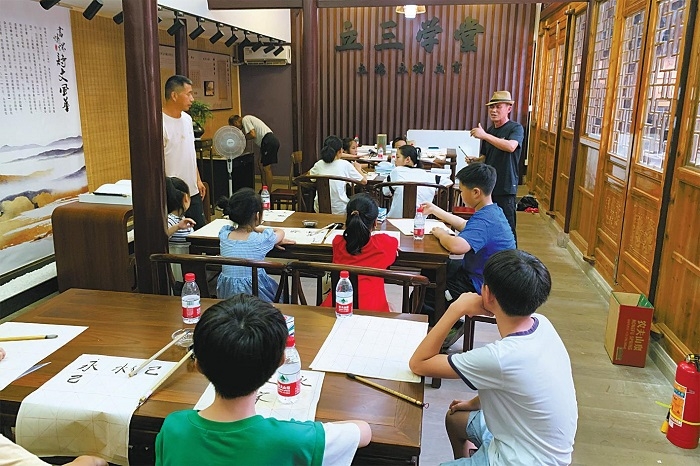Traditional culture classes in the village
- Details
- Category: Top News
- Published: Tuesday, 10 October 2023 14:37

Wang Bixiong's calligraphy class was packed. (Photo by Qiu Saiyin)
"When holding the pen, the palm of the hand is empty, hide the front to pick up the pen, move the pen steadily, and return the front to close the pen." On August 31, in the newly renovated Mahogany Rhinoceros Museum in Fangqian Village, Xiangshan County, retired
teacher Wang Bixiong taught the village children to write brush characters. "I used to see my senior students in school writing brush characters, and I felt that they were very good, but now I can write too." Second-year student Wang Jiaqi said proudly.
Fangzen Village has always focused on cultivating and reading heirlooms. In 1860, Wang Xinglan, together with Yao Xie, a famous scholar in eastern Zhejiang and a late Qing dynasty writer, jointly founded the first literary society in the history of Xiangshan "Red Osmanthus Poetry Society". According to records, after the establishment of the "Red Osmanthus Poetry Society", the literati and scholars around Xiangshan responded one after another, and celebrities from Taizhou, Shaoxing, Hangzhou, Huzhou and other places actively participated.
"During the Qing Dynasty, our predecessors were highly accomplished in literature and art, and enjoyed great fame throughout eastern Zhejiang, and we are very proud." Wang Bixiong, the fifth-generation descendant of Wang Xinglan and a calligraphy lover, heard that the village was going to revive the "Mahogany Rhinoceros Poetry Society", and he responded positively, not only donating calligraphy books, but also teaching calligraphy to the children in the village for free.
"Riding a seahorse on the knee is like a flying roe, and the bamboo is full of smear. In the eighth day of the first year, every little water, good research and glutinous boiled beard. This is the scene in Yao Xie's poem of Xiangshan fishermen riding wooden seahorses to catch jumping fish on the beach, and now it has also become the teaching material in the mahogany rhino poetry class.
"The poems left by the predecessors of the 'Redwood Rhinoceros Poetry Society' are close to the production and life of working people, and we ask children to find the heritage of culture in the process of inheriting culture." Bao Liangbiao, vice principal of moral education at Xiangqiangtou School, introduced that in the course, the children used the poems left by local sages as a model, and through "searching, drawing, photographing, writing and chanting", they could taste poetry scenes and feel the charm of poetry, so as to better inherit the cultural heritage.
"It is a great pleasure to pass on the excellent traditional culture of the village from generation to generation." Wang Youfeng, secretary of Fangqian Village, said that they will continue to run the "Red Osmanthus Poetry Society" in the future, so that more children can receive the influence of traditional culture








